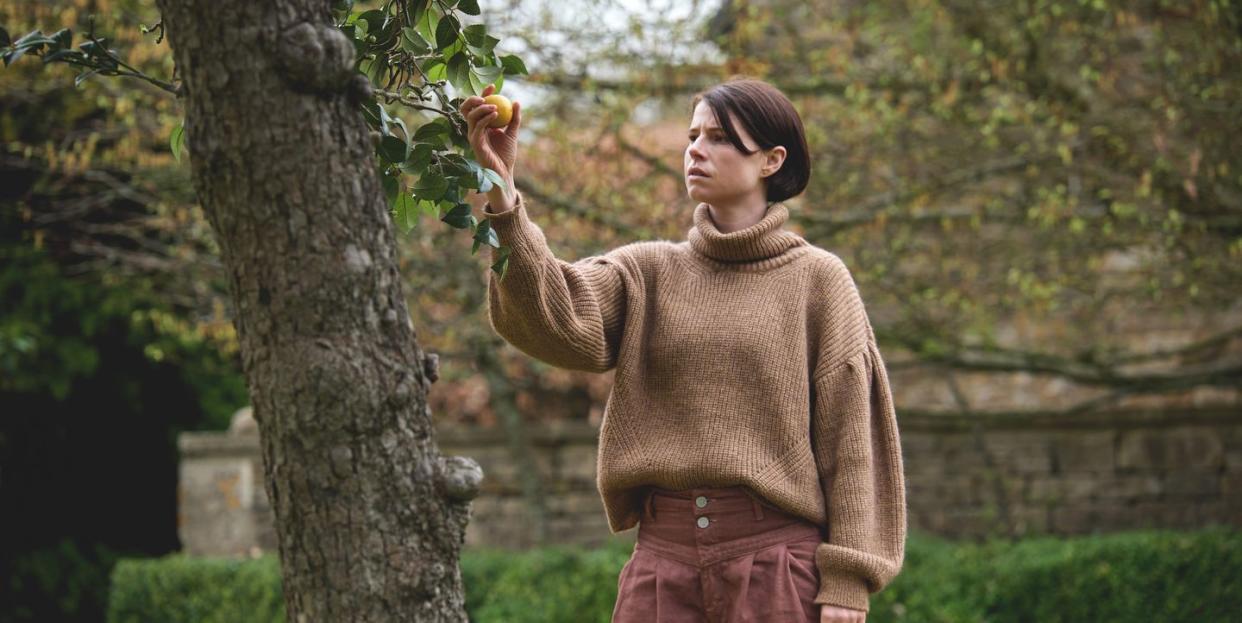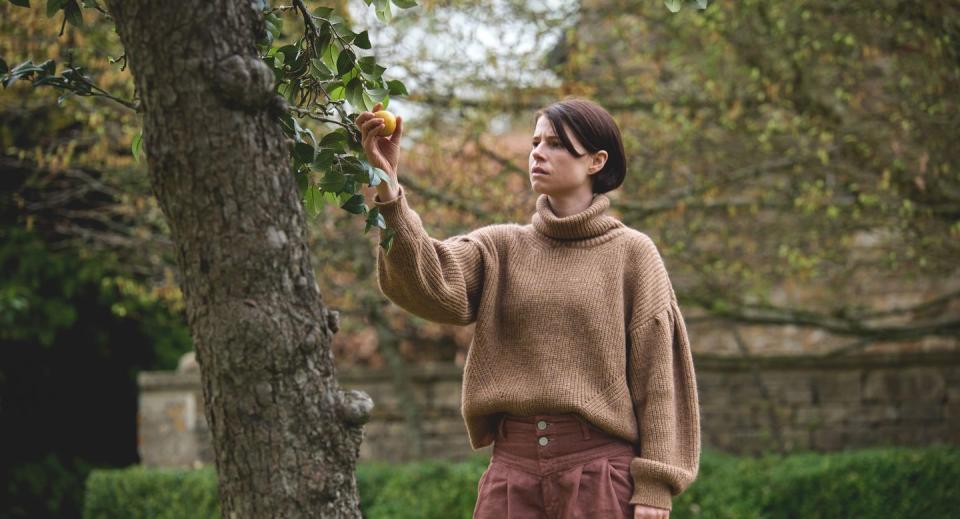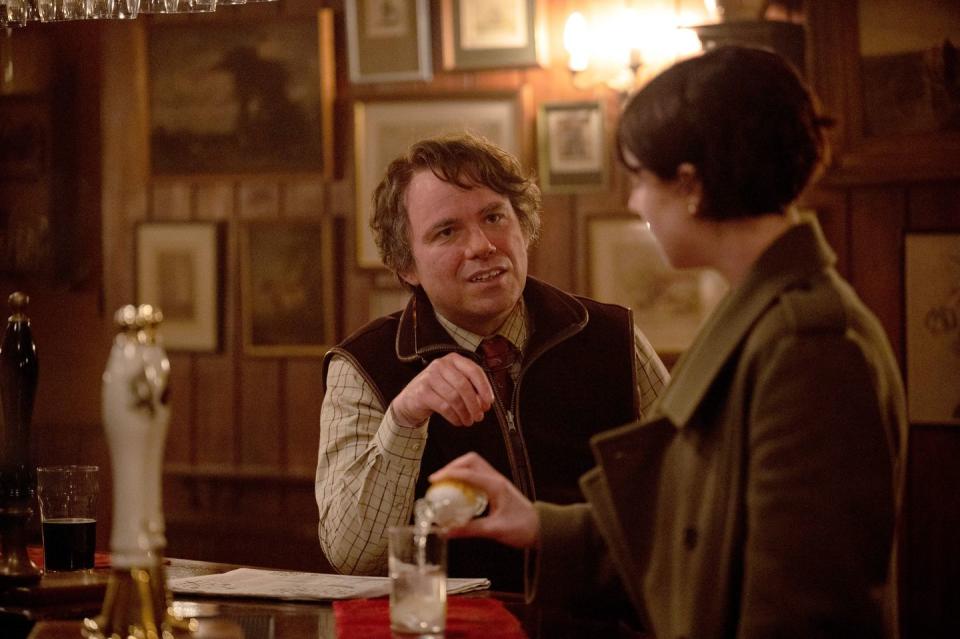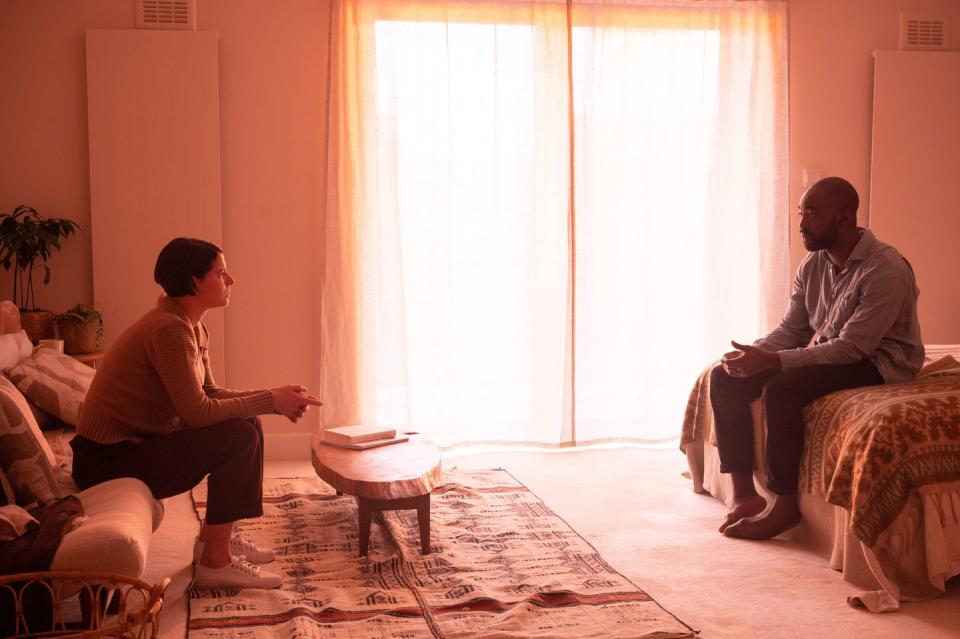Men needs to be as obvious as it is

Spoilers for Men follow
There is a scene in Men in which a trauma-stricken Harper screams her head off inside a church. It is a moving, painful and purging private moment.
Only it isn't private. Lingering in the back is the vicar (played, as all the Men in Men are, by Rory Kinnear) who observes, but does not interrupt, Harper's catharsis. Outside, however, he stops her from being harassed by a bratty kid (also Kinnear, in the creepiest CGI ever seen) and invites her to chat.
They have a frank and, at first, quite intimate conversation but soon it veers off course, as the vicar asks if Harper ever wonders why she drove her husband James (Paapa Essiedu) to suicide. "F**k off," she tells him, seething with anger, and shouts it again after him as she leaves the churchyard.

This is just one of the numerous moments in Men that illustrate, very blatantly, the kind of vulnerability that women face when confronted with, as Kinnear calls it the "spectrum of male aggression" and upon leaving the cinema as the film continued to percolate, one memory in particular bubbled up to the surface.
At 21, in my final year at University, I was casting students from a nearby school in a play I wrote about the AIDS Service Organisation in our town. An older male professor from that neighbouring University stumbled into the auditions and we entered into a seemingly friendly conversation about the subject of the play.
"You know my favourite method of birth control. An Aspirin." Sensing my confusion, he clarified: "All a woman has to do is hold it between her knees."
I laughed. Now, even as I write, my heart is pounding in my chest and I wish I'd had the wherewithal of Harper to meet his inappropriate remark with the same vehemence. Much like the vicar, this professor – an older, male stranger – used a position of power to put me into an intimately vulnerable position.

It wasn't a joke. Moreover, it was threatening in a way, and the idea of what constitutes a threat is another theme that comes up in Men explicitly and repeatedly. It was the straightforwardness of Garland's portrayal of the various forms of male aggression that I found strangely refreshing.
It was a purposeful choice that Buckley appreciated, too. "That's what I love about Alex [Garland]," she told Digital Spy. "He's kind of bold like that. He's not... making something palatable... he's really, kind of just being a bit punk about just putting it out there."
Because when men harass women, it isn't subtle. It might start out that way, but inevitably there comes a point where the subtle slights turn bold. Society's gender roles have encouraged women to placate men, to laugh at their 'jokes' and defer to their power.
Sometimes this is for our physical safety, but sometimes when we get home and sit with the memory of what happened, we wish we'd had the wherewithal to say something equally forceful back. 'F**k off' was the retort the vicar deserved.
Buckley found the job of telling these various men to "eff off" to be "very exciting," and it's easy to understand why. Kinnear's job was, in a way, almost more difficult. "I had to create all of their life and within their lives Harper's quite a tiny little moment. So what about their lives led them to be off-hand or led them to be challenged by a woman?"
The question Kinnear asked of the various characters he played was: "What about them, necessarily, would lead to the behaviour that we've seen? And I think they probably all did, to a certain extent, have a sort of a seam of loneliness within. And so I guess we're at that point — you don't have to fall in love with your characters but you do have to sort of understand where they're coming from."

Each of these men put on Harper their own version of her perceived villainy: the bitch, the mother, the temptress. For Buckley, internalising every single one of those troubling and dehumanising roles was part of the job. "I felt like my job was to internalise that, be affected, and also take that and tell them to kind of... eff off."
Buckley laughs brightly because the notion of it is somehow both absurd now and also gratifying. In a way, Harper's ability to refuse to kowtow to the men in the village is the ultimate wish fulfilment — even if the rest of the film is more nightmare fuel than anything else, and the obviousness of this message within the imagery, dialogue, and symbolism of the film speaks to the visceral nature of women's lived experience with it.
But it is a film — and a horror film at that — so Harper's experience becomes one of heightened cinematic choreography. Warning, spoilers for the final moments of Men follow.

She fights off each man, inflicting upon them facsimiles of the wounds her husband suffered as a result of his suicide. In a doubly heavy-handed metaphor, she kills the Agamemnon-quoting Vicar in the bathroom after he puts his spliced forearm around her neck in a grotesquely vaginal image and tries to rape her.
However, as Dylan Thomas says, 'death shall have no dominion' and the men continue to spawn each other, male violence begetting male violence until finally James appears and confronts Harper, who asks, exhausted, what it is he wants.
This penultimate moment in the film is the final swing of the hammer on the nail-head. Your love, he says. "Yeah," Harper replies.

We'd argue that it didn't have to be James to deliver this denouement — and the fact that he does feels a bit too showy even for Garland thus far. But it's forgivable because it is a moment of dialogue that so succinctly ties up everything this film wants to say about men:
Men want things from women — love, sex, power, attention, control — whether women want to give it or not. So when Harper says 'yeah' in her begrudging knowledge of 'Yep, men', it's a sentiment that we can all relate to, too.
It is the opposite of her triumphant 'F**k off', but just as visceral in its relateability.
Men is now out in cinemas.
You Might Also Like

 Yahoo News
Yahoo News 